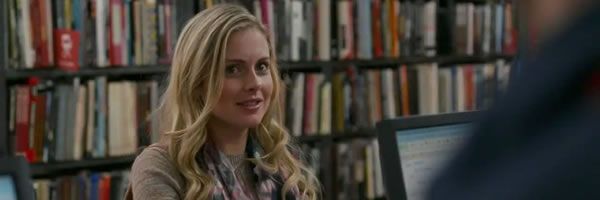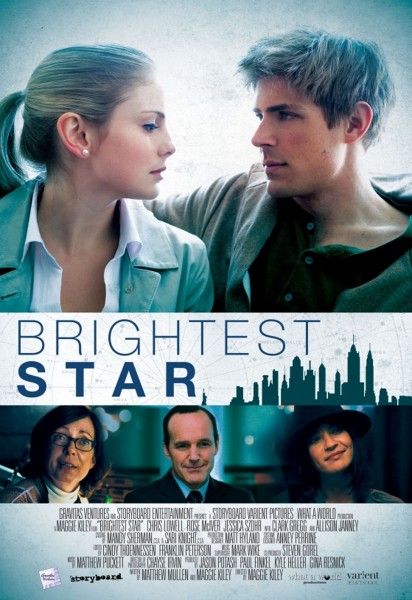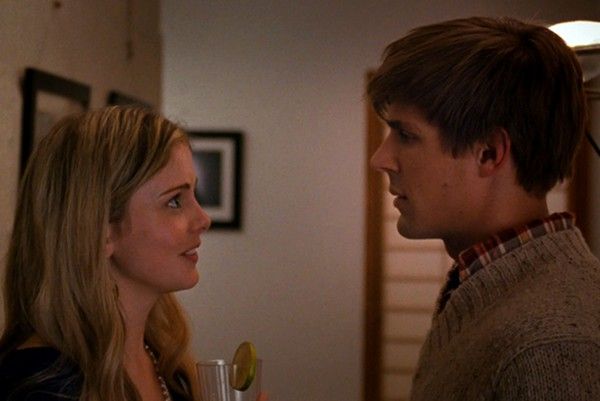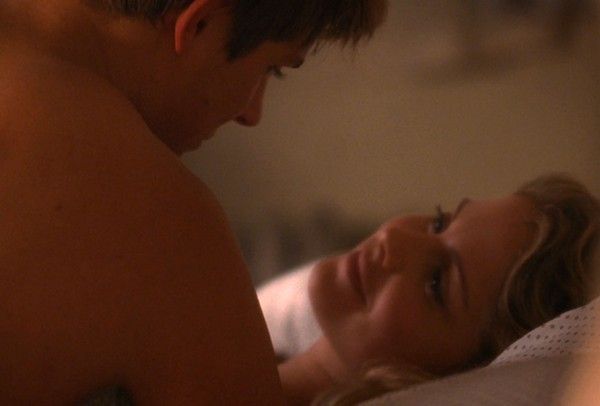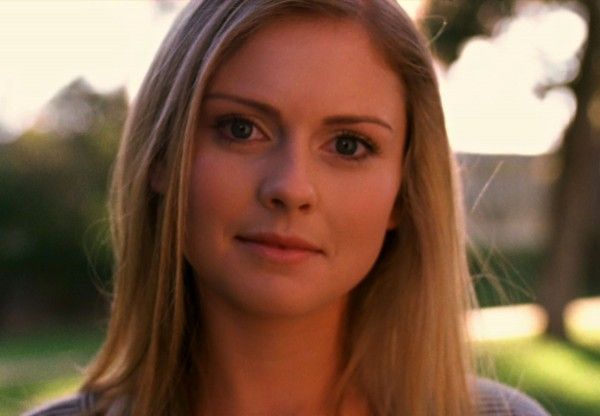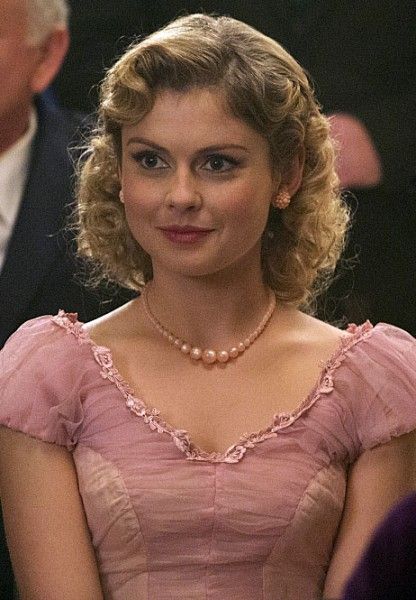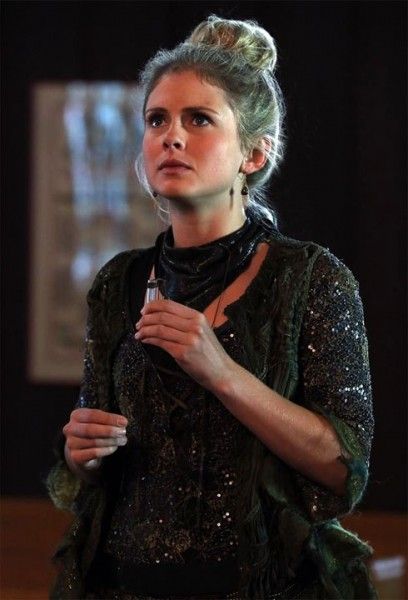The indie dramedy Brightest Star tells the story of a young man (Chris Lowell) who’s fresh out of college and devastated because the girl of his dreams (Rose McIver) has dumped him. While trying to transform himself into the man she desires, he starts to find the person he might actually be. From director Maggie Kiley, the film also stars Clark Gregg, Allison Janney and Jessica Szohr.
At the film’s press day, actress Rose McIver spoke to Collider for this exclusive interview about how she came to be a part of this film, what she thought she could bring to this character, working with Chris Lowell, what Maggie Kiley was like, as a director, and what she loves about acting in all mediums. She also talked about the great experiences she’s had working on Masters of Sex, where Beau Bridges and Allison Janney play her parents, and playing Tinker Bell on Once Upon A Time. Check out what she had to say after the jump.
How did this come about for you?
ROSE McIVER: I was given the script, the day before I went back to New Zealand. I was booked on a flight, and I read it and my manager said, “The director is around tomorrow and would like to meet you.” I was frantically packing and trying to get ready to go, but I thought it was definitely worth it, after I’d read the script. So, Maggie [Kiley] and I sat down at a coffee shop, and I just knew, after talking to her for an hour, that I really wanted to do it. She seemed very interested in me, and we both were like-minded, in how we viewed the character and the project. It just was exciting to me. So, she said, “When you go back to New Zealand, can you send a couple of scenes for me to show the producers?” After meeting her, I sent a couple of scenes, as an audition, and it was all go from there. It was just wonderful.
Is it just never an easy thing to do, to put yourself on tape for an audition, or did it make it easier that you had already met the director first and knew what she was looking for, with the role?
McIVER: Yeah, absolutely! When you go in, you’re making choices. That’s what you do at an audition. You hopefully make some strong choices, and you go in with the text and hope that the casting director has been briefed on which direction to push you in. But without that person, sitting there and breathing down your neck, telling you what to do, it is blind. I was just really lucky that the day before, I was able to really clue in on what Maggie was after and what she needed from the character, so that my choices were more informed with that audition.
With something like this, that is such a character piece and a relationship journey, is meeting with the director crucial to making sure you’re on the same page before you agree to play the role?
McIVER: Yeah, definitely, especially with something told out of sequence that’s a subtle piece. It’s very much about the relationship between these characters, so it definitely helps to meet the director and know what their take is, how sensitive they are, and which direction they want to go with the material. I wouldn’t have undertaken this film, which could have been quite ambitious, unless it was with somebody who I really trusted. Maggie did that.
What was it about Charlotte that you saw something in and thought you could bring something to her?
McIVER: I think that thing that happens, when you finish school and all of the ideals that you think you have about the world, and who you’re going to be are suddenly thrown into question, and what you want out of relationships and what you want out of your career and what matters to you is suddenly much more unfamiliar territory. For me, I had just come out of school and I was asking those questions, and I still am, to an extent. I hope I always do. I think it’s important to always explore and ask those questions. So, it just felt like the right time to do something that resonated with me like that.
How did you view the relationship that Charlotte had with The Boy (Lowell)?
McIVER: My school of thought, with going into a character, is that you have to understand where they come from and you have to empathize with them. Although some of Charlotte’s choices aren’t in The Boy’s best interests, necessarily, they were in Charlotte’s best interest, at the time. Every decision that she made wasn’t just purely selfish. Nobody acts purely selfishly. Everybody has needs and wants, and she had questions that she needed to answer. So, I understood Charlotte’s perspective. She’d worked really hard towards this career that she was trying to serve. Going in with empathy towards a character is the only way you can approach it.
How did you go about developing this relationship with Chris Lowell?
McIVER: Chris and I were lucky, in that we started emailing each other several months before the project. And the back and forth that we had, we were able to build a connection. It wasn’t so much about building a backstory, as it was about building a genuine connection between us where we understood each other and got each other’s sense of humor. We knew triggers that would make that person laugh, or maybe irritate that person, if that’s what you needed. Just to build something that you can draw from that organically, when the shoot is only 18 days long, is incredibly useful, so we did that. I think it was lucky that Chris and Maggie and I were all on board to be collaborators, in that way. We were all enthusiastic enough. Not everybody you meet wants to put the time into that. I was just very grateful that I had them.
What was it like to actually work with Chris, on set?
McIVER: Chris is such a generous actor. He and I get along incredibly well. We’re great friends. So, when we started working together, we both trust each other and respect each other. I know that I don’t have a perfect performance that I bring to set. I bring ideas to set, and I’m more than willing for those to be affected and be malleable, based on what the other person gives me. I don’t know what another actor is going to give me, on the day, and I don’t want to be so hard and fast in my technique that I’m not open to what’s coming. So, there was a lot of flexibility that we definitely embraced. We were just lucky that we had a similar style of working like that.
Did you do much improvisation on this?
McIVER: What’s great about this film was that the script was so well-written. The dialogue was incredibly well-written. Maggie is clearly an actor and comes from a background of having to read other people’s words, and she knows what flows. We didn’t struggle. Maybe there were one or two moments in the process where, for whatever reason, I couldn’t find an organic way to a line. And if I was really up against a wall, I would raise that question. But, I come from a background of reading a lot of really great texts by great people, and when there’s a good wordsmith that you’re dealing with, you want to honor those words. Yes, there is improvisation and there’s flexibility about timing. I’ve never stuck to punctuation, in my life. But, they were deliberated over, for a long time, for a reason. And that line, even though you might struggle with it, in the moment, is serving a purpose in the greater scheme of things, that is probably stronger than the choice you might make, on the day. That happened to be the way this best worked, with those two collaborators.
There is a range of emotions in this relationship. As an actor, do you personally enjoy the more playful scenes and moments, or do you enjoy the more emotionally intense stuff?
McIVER: I think you can’t really reach the emotionally intense stuff without having built a genuine light, playful, connected energy, to begin with. The fact that Chris and I have this really great chemistry and this dynamic between us that we enjoy so much means that when it comes to subverting that, there’s something at stake and there’s something we don’t want to lose, and that makes it more painful, and that makes us more invested in that performance.
Were you surprised at how, even though this is a story that’s very specific to these characters, it really does feel universal when you watch it?
McIVER: Yeah. I think that’s what drew me to the project, in the first place. So many people I know were asking big existential and identity questions that, when I read the script, it felt like it had fallen in my lap as an opportunity to explore those.
There are still so few female directors compared to male directors. What was it like to work with Maggie Kiley, as a director?
McIVER: I’ve thought about that a bit. I’ve worked with female and male directors. I’m lucky like that. So for me, I’ve just always known that women were more than capable of being able to direct. It’s great to meet Maggie, who is incredibly professional at what she does, but I’m not surprised by it, at all, and I wish other people weren’t. She deserves plenty of opportunities to show that. She’s incredibly communicative, she’s sure-footed, and she doesn’t have a big enough, crazy ego not to let other people’s voices matter. She listens, and that’s essential for a director. She’s got the whole skill set.
At this point in your career, what do you look for, in a script?
McIVER: The reason I feel like I act is because you get to live a million different lives in one. I don’t have to go about my life, just being easy-going New Zealander Rose. Sometimes I can inhabit a feisty, vicious character. Sometimes I can inhabit a painfully shy British girl, or whatever it might be. I’m able to step into these other parts of myself. I feel like, as long as I keep doing that in my career, and I keep tapping into different parts of the human condition, that’s all I ask for.
What’s it been like to be a part of Masters of Sex and do a show about a subject that people are still somewhat afraid to talk about, even though they’re fascinated by watching it?
McIVER: To me, it’s fascinating because it is something that has existed forever, and it’s something that people have had hang-ups about or questions about forever, as well, but it had only begun to be discussed openly in the ‘50s and onwards. Even then, we look at things today and there’s a lot of questions that still can be raised, and there are things that people still feel uncomfortable to talk about. So, it’s interesting to put it in a ‘50s context, where everybody has these societal expectations that are really obvious, and the characters struggle with it because of that. Looking around today, while people are more politically correct about it, there’s still the pressure and there are still the same questions. We’re on our way to understanding those sides of ourselves, in a public forum. We owe a lot to people like Masters and Johnson for generating that conversation.
What has that cast been like to work with?
McIVER: Insane! They’re so good. Allison Janney is in Brightest Star, and she’s playing my mom in Masters of Sex. Chris has also worked with her on The Help, so we both have two Allison Janney credits to our name, and we’re fighting for the third. I love her so much. I think she’s a brilliant actress. I really look up to her. It really is a great cast. We’re so lucky. It’s nice that nobody that I worked with lauds their ability above anybody else. There are newcomers and seasoned professionals alike. And everybody knows that to service the project the best that you can, you create an environment where nobody is intimidated and everybody does the best work that they can.
What’s it like to get to play a character as iconic as Tinker Bell on Once Upon A Time?
McIVER: It’s one of those things you think about, as a child. Who really is going to end up playing Tinker Bell on a TV show for their job? It’s a fantasy. I’m really grateful. I’m lucky. It’s nice to be working on something that people back in New Zealand have been watching and enjoying. It has such a dedicated, supportive fan base, which I’m really grateful for. And it’s a lot of fun. Flying around in a harness and working with the wonderful cast in Vancouver, I’ve been very grateful.
Was it challenging to find a way to really own that character?
McIVER: That’s what Once Upon A Time is about. There are these fantastical characters inhabited by humans, and we’re working to make sure we keep them really grounded. What’s useful is that the story does all of the fantastical work for you and brings about this sense of magic and surrealism, and what you’re supposed to do, as an actor, is come in and make sure the character is still three-dimensional and relatable. To be honest, I think my work was just in being genuine.
Have you had any particularly surreal moments on that set?
McIVER: Yeah. I think I have those quite regularly, on some of the things I’ve done, over the years. I did Xena and Hercules and Power Rangers and Legend of the Seeker. I’ve done these things that have a fantasy element, and you look around at the world that you’ve created and that you’re a part of, and it’s so funny that you get to go to work to do that. I get up in the morning and go put on spandex or wings. It’s the make-believe side that you think about when you’re a child and you imagine what acting is. To be able to experience some of that is just joyous.
Is it important to you to find a balance between film, where you can tell the entire story of a character, and TV, where you can take an on-going journey?
McIVER: Yeah. More and more, these days, television is working with great writers that are able to develop long-term arcs for characters that are still as complicated and interesting as they can be in feature films. It used to be that sometimes there was a lot more padding in television, and that’s not the case anymore. I think there are really, really good opportunities to delve deeper and deeper into a character, over multiple episodes. The great thing about being an actor in a film is that you’re able to start knowing exactly where you’re going to finish, and really paint something in between. You can work to know the arc you need to build. Whereas in television, it is open-ended and you’re constantly guessing. There are pros and cons to both. It’s great to do theater, as well, and have the live response and know what that can bring to a performance. I like to juggle as many mediums as I can.
Brightest Star is now playing in theaters.

